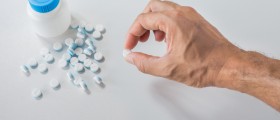
Zidovudine
Zidovudine (azidothymidine, AZT, ZDV, Retrovir, Retrovis) is an anti-viral agent, used in HIV treatment. This medication is also used to prevent the transfer of HIV infection from mother to the unborn child.
Zidovudine belongs to the group of medications known as nucleoside analog reverse transcriptase inhibitors (NRTIs), which block enzyme responsible for the reproduction of HIV virus.
This medication was the first drug ever approved for HIV treatment and is still in use.
Side Effects
Sometimes it’s hard to differentiate between the symptoms of AIDS and side effects of the medications used to treat this illness. Most of the adverse effects of NRTIs are caused by their toxicity to mitochondria. These include myopathy, lactic acidosis, pancreatitis, and liver problems.
Zidovudine affects the blood cells, causing the suppression of bone marrow. This effect is most likely to occur 2 to 6 weeks after the start of the therapy and it is dose dependant. There are some recombinant medications used to treat the toxicity, such as sargramostim (GM-CSF), filgrastim (G-CSF) and epoetin alfa (eryhtropoetin). These medications don’t work always, and bone marrow suppression is still one of the reasons for quitting this medication.
Patients using zidovudine are recommended to be careful and make frequent blood test, especially if the disease is advanced.
Hematologic side effects include: neutropenia, granulocytopenia, anemias and thrombocytopenia. There were also cases of aplastic anemia, pancytopenia, leucopenia and aplasia of red blood cells.
Zidovudine affects the metabolism and endocrine system, causing hyperlipidemia, hyperbilirubinemia, increase of body fat, gynecomastia and cushinoid syndrome.
Patients on zidovudine therapy often experience nausea, vomiting, abdominal problems, diarrhea or constipation, stomatitis, and splenomegaly. Also, some patients have reported mouth ulcers and pancreatitis.
Liver problems are quite frequent in zidovudine patients. The most common are increase of liver enzymes (AST and ALT), hepatomegaly, lactic acidosis, hepatitis, jaundice and hepatic failure. When prescribing zidovudine, there should be special attention paid to patients with preexisting liver conditions.
Patients often experience muscle and joint pain, myositis and weakness of the limbs. These side effects are usually connected with the increase of creatine kinase levels. Other musculoskeletal side effects include increase of lactate dehydrogenase, muscle tremor and spasms, and rhabdomyolysis.
Zidovudine may affect the nervous system and provoke asthenia, tiredness, fever and lympadenopathy. Patients have reported cases of flu-like symptoms, weakness and pain throughout the body, back and chest pains and loss of hearing and taste. Also, this medication might be the cause of mania, anxiety or depression.
This drug may cause nail and skin depigmentation, skin rash, fever, eosinophilia and vasculitis. The color change usually disappears after couple of months. There were cases of allergic reactions to zidovudine, present as skin rash, angioedema and anaphylaxis.
Zidovudine rarely affects the heart, causing congestive heart failure, vasodilatation and syncope.
Patients with syphilis complications may suffer from eye problems related to the use of zidovudine.
Children treated with this medication often experience respiratory problems, such as breathing problems, congestion and cough, and sometimes rhinitis and dyspnea. Also, they might suffer from swelling, ear pains and erythema.
Zidovudine treatment may cause vitamins B and C, zinc and folate deficiency. Because of that, specialists recommend using multivitamin supplements.

















Your thoughts on this
Loading...